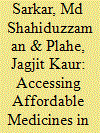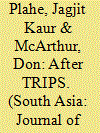| Srl | Item |
| 1 |
ID:
182858


|
|
|
|
|
| Summary/Abstract |
The cost of medicines in Bangladesh is among the lowest in the world. Over the last forty years, Bangladesh, a Least Developed Country (LDC), has nurtured a local industry based on strong industrial policy and a pharmaceutical patent-free system. Of the 46 LDCs in the world, it is the only one to have a thriving industry of this kind. In this paper, we explore how a relatively poor LDC managed to take on the dominance of MNCs in the global production of pharmaceuticals. We focus on the 1982 National Drug Policy (NDP) which transformed the pharmaceutical sector in Bangladesh from one in which three-quarters of drugs were supplied by just eight MNCs to one where almost all domestic demand is met by local industry. The thriving local pharmaceutical industry also exports generic medicines to 147 different countries. In 2026, Bangladesh is due to graduate to ‘Developing Country’ status, at which time, as a member of the WTO, Bangladesh will have to abide by the Trade-Related Aspects of Intellectual Property Rights (TRIPS) Agreement. Under TRIPS it will have to change its patent regime to allow for the registration of pharmaceutical patents by 2029. Using interview data with key Bangladeshi experts, we argue that TRIPS compliance could potentially wipe out this flourishing local pharmaceutical industry, leading to steep increases in the cost of essential medicines, with dire implications for the right to health. We explore policy options open to the Bangladesh government to protect affordable drugs in the country, in particular protection for the production of domestic generics in a post-TRIPS environment. We also argue that there are ways in which Bangladesh and India could co-operate to protect the affordability of high-quality medicines for domestic and international markets.
|
|
|
|
|
|
|
|
|
|
|
|
|
|
|
|
| 2 |
ID:
182856


|
|
|
|
|
| Summary/Abstract |
India has long played a key role in supplying low-cost pharmaceuticals to people in developing countries, gaining a reputation as ‘the pharmacy of the developing world’. Yet, changes to India’s intellectual property regime under the World Trade Organization’s 1995 Trade Related Aspects of Intellectual Property Rights (TRIPS) Agreement mean that India’s capacity to produce and supply affordable medicines has been undermined. We use a political economy approach to investigate the factors that are determining the future of Indian generic pharmaceutical companies as suppliers of affordable medicines in the ‘post-TRIPS’ environment. We argue that while there is some scope within this environment for legal safeguards to protect access to life-saving medicines, the future of the ‘pharmacy of the developing world’ is in question, not just because of the ownership rights awarded to multinational corporations (MNCs) under the TRIPS framework, but also because of the way the market system is tilted towards MNCs. MNCs can ‘play’ the system locally and across the world, including by exerting pressure on safeguards that India instituted to protect the affordability of medicines. Against this background, we explore the challenges faced by the Indian government in creating an environment that is more likely to ensure access to life-saving medicines.
|
|
|
|
|
|
|
|
|
|
|
|
|
|
|
|
| 3 |
ID:
090213


|
|
|
|
|
| Publication |
2009.
|
| Summary/Abstract |
This paper analyses the Indian government's policy response to the Trade-related Intellectual Property Rights Agreement (trips) and examines the implications of this response for food security and farmers. trips has become one of the most controversial agreements of the wto. This is because of its wide and far-reaching mandate and its complex socioeconomic implications. It is argued that the changes made to the Indian Patents Act in response to trips will compromise the food sector and the rights of small farmers by conferring strong rights on upstream agents who produce proprietary agricultural inputs using biotechnology. Not only are these agents able to exert monopoly price control over agricultural inputs for 20 years, they also have the right to determine the conditions under which farmers and researchers use patented processes and products. The paper outlines policy options available to the Indian government to tighten the scope of patentability in the food sector.
|
|
|
|
|
|
|
|
|
|
|
|
|
|
|
|